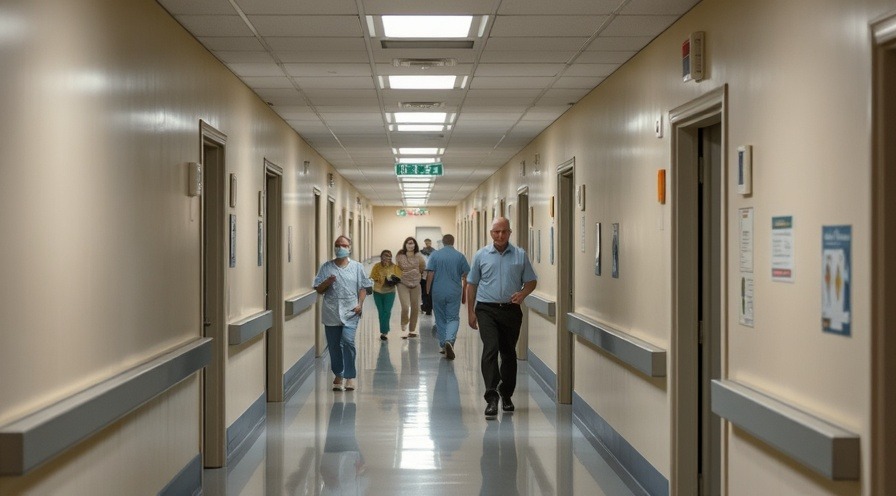
Is Relief Finally on the Horizon? Unpacking North Carolina's Bold Moves to Tackle Sky-High Healthcare Costs
When the topic of healthcare costs comes up around the dinner table, it's often met with a collective sigh, maybe even a touch of anxiety. We all want quality care, but the ever-increasing bills and the often-murky processes can leave us feeling frustrated and, frankly, a little helpless. But what if I told you that change might actually be on the way?
Here at NCWellnessHub.com, we've been keeping a close eye on some significant developments coming out of Raleigh, and it looks like our lawmakers are feeling the pinch just like the rest of us. Across party lines and through both chambers of the General Assembly, there's a palpable push to reform North Carolina's healthcare system. This isn't just talk; concrete measures are being advanced, and one bill in particular, Senate Bill 316, is generating a lot of buzz.
Imagine a future where hospital bills are easier to understand, where unexpected "facility fees" become a thing of the past, and where insurance companies don't keep you waiting endlessly for crucial approvals. That's the potential that SB 316 is aiming for. According to the bill's text, a key focus is on lowering healthcare costs and bringing much-needed transparency in billing.
State Senator Amy Galey (R-Alamance) eloquently captured the sentiment behind these efforts. She stated that this legislative push is "a step in curtailing 'unacceptably high healthcare costs'". That's a powerful statement, and it resonates deeply with the experiences of so many North Carolina families.
Senator Galey further highlighted a crucial aspect of the bill, emphasizing "greater fairness in billing and collections practices; it requires an itemized list to any patient before referring an unpaid bill to a collection agency". Finally, having a clear breakdown of charges before facing collections? That sounds like a significant step towards empowering patients and holding the system accountable.

But SB 316 isn't the only piece of the puzzle. It also seeks to establish a timeline for insurers to conduct prior authorizations, a move that echoes the goals of House Bill 434. How many times have we or our loved ones been stuck in limbo, waiting for an insurance company to approve a necessary procedure or medication? These delays can cause immense stress and even impact health outcomes. The focus on streamlining prior authorization processes could mean faster access to the care we need, when we need it.
Now, you might be thinking, "This all sounds promising, but how bad is the situation in North Carolina really?" Well, analysts at WalletHub painted a rather sobering picture, ranking our state among the Top 10 Worst States for Health Care in 2025. Their research took into account a comprehensive 44 metrics, looking at quality, cost, and accessibility of care.
As WalletHub writer Chip Lupo explained, "Basically, patients are not really getting the most bang for their buck". He elaborated on the factors contributing to this ranking, pointing to the quality of public hospital systems, the number of hospital beds per capita, and the availability of physicians, nurse practitioners, and even access to urgent care centers and rural health clinics, noting that the latter is a "key point here in North Carolina".
Lupo also identified a concerning "regional pattern," linking the lower rankings of several Southern states to underlying socioeconomic factors. He poignantly stated, "You go east of I-95 where I’m from. Still a lot a lot of farming, a lot of low income. So while and you would think that with Duke University and North Carolina, all these great medical centers, the health care outcome would be a little bit more favorable, North Carolina. But it’s simply not the case". This highlights a crucial disparity within our state, where access and quality of care can be significantly different depending on where you live and your economic circumstances.

Adding another layer to the complexity, a study by Forbes identified North Carolina as the most expensive state for healthcare, citing the highest average premium for residents with “plus-one” health insurance. This stark statistic underscores the financial burden that healthcare places on many North Carolinians, even those with insurance coverage.
Despite these challenges, Lupo offered a glimmer of hope, noting that patient outcomes in North Carolina are trending in a positive direction. This suggests that while we face significant hurdles in terms of cost and access, the quality of care itself is showing signs of improvement.
So, what does all of this mean for you and your family? Senate Bill 316, along with related efforts, represents a significant step towards addressing the pressing issues of healthcare affordability and transparency in North Carolina. The requirement for quarterly cost data reporting by hospitals to the Department of Health and Human Services could lead to greater accountability and a better understanding of where our healthcare dollars are going.
The outlawing of facility fees could result in significant savings for patients who often face these unexpected charges. And the empowerment of the State Auditor to examine billing transparency could act as a crucial safeguard against unfair practices.

Furthermore, the push for clear timelines in prior authorizations promises to reduce delays and anxieties associated with accessing necessary medical care. While challenges related to healthcare access in rural areas and the overall cost of health insurance remain, these legislative efforts signal a willingness from our lawmakers to confront these issues head-on.
In conclusion, the healthcare landscape in North Carolina is at a critical juncture. The acknowledgment of "unacceptably high healthcare costs" and the introduction of measures like Senate Bill 316 offer a tangible path towards a more affordable, transparent, and equitable system. While the journey may be long, these initial steps are crucial.
It's essential for us, as concerned citizens, to stay informed, engage with our representatives, and advocate for continued progress in making quality healthcare accessible and affordable for all North Carolinians. The stories and insights shared today underscore the urgency and the potential for meaningful change. Let's keep the conversation going and work together to build a healthier future for our state.
 Add Row
Add Row  Add
Add 




 Add Row
Add Row  Add
Add 

Write A Comment